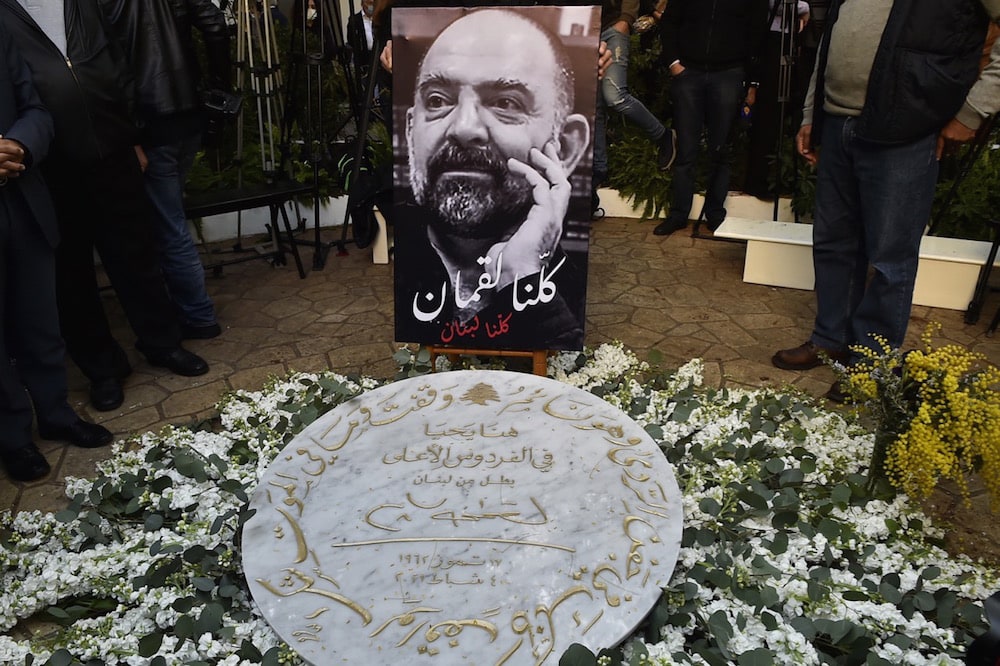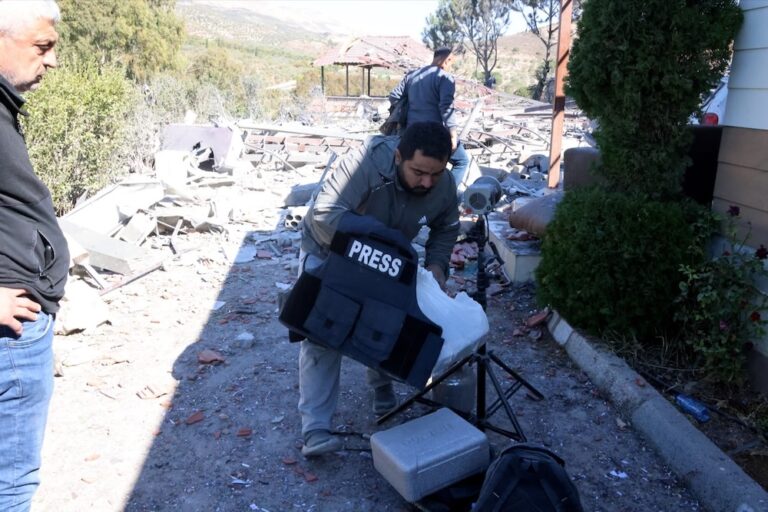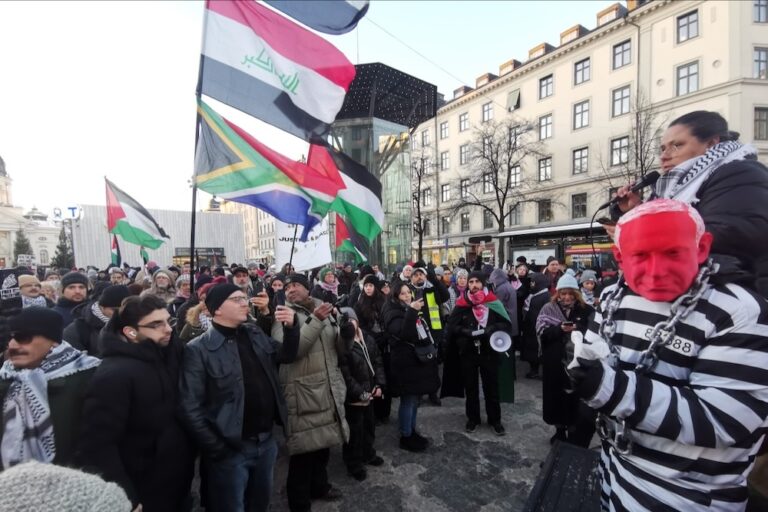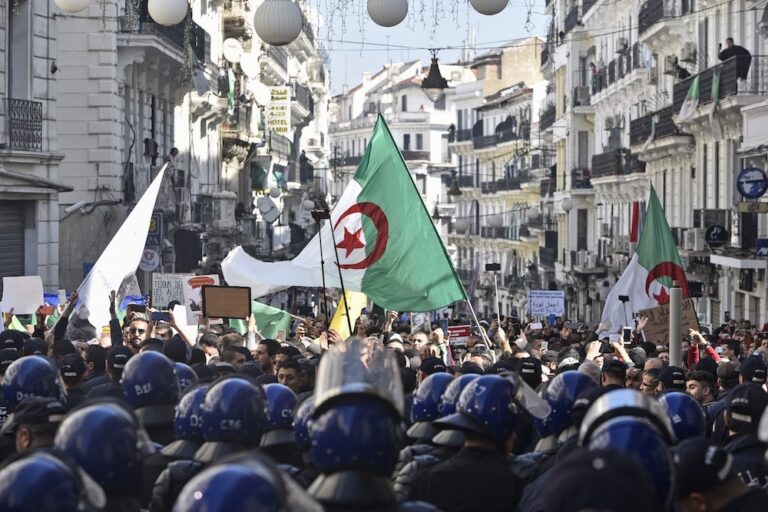IFEX joins the Gulf Centre for Human Rights and rights groups in marking the International Day to End Impunity by calling for an end to impunity for perpetrators of crimes against journalists in the MENA region.
This statement was originally published on gc4hr.org on 2 November 2021.
On the eighth anniversary of the International Day to End Impunity (IDEI) for Crimes Against Journalists, on 2 November 2021, a group of local, regional and international human rights organisations held an event entitled “No Impunity for Crimes Against Journalists in the Arab Region” in Beirut. The day was approved by the United Nations General Assembly at its 68th session in 2013.
The activities included a seminar moderated by Gulf Centre for Human Rights (GCHR) Executive Director Khalid Ibrahim, in which human rights lawyer Tony Mikhael, a legal advisor at Maharat Foundation, Communication and Information Program Officer at UNESCO’s Beirut Office George Awad, President of the Bahrain Center for Human Rights (BCHR) and IFEX Convenor Nedal Al-Salman, and journalist Abeer Mohsen, of the Yemeni Archive Organisation, participated.
The activities also included questions and answers with journalists, and a photo gallery with photos of journalists who lost their lives in the Middle East and North Africa (MENA) region during recent years until 2021.
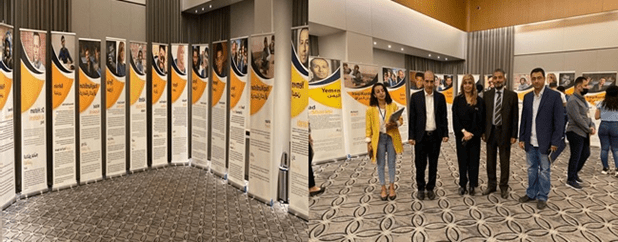
GCHR’s Khalid Ibrahim presented a general framework on the situation of impunity for crimes committed against journalists in the Arab region. Ibrahim pointed out that the images of journalists who sacrificed their lives for their profession, which we see prominently in the annual IDEI exhibition, should motivate us to work together, in order to end impunity and prosecute the perpetrators of those crimes.
Ibrahim said, “We must work with each other as civil society organisations, international mechanisms and relevant governments to immediately end impunity in the MENA region, which remains one of the most dangerous areas in the world for journalists.”
View the annual GC4HR “No to Impunity” report
Maharat’s Tony Mikhael said, “The celebration of this occasion comes as ten months have passed since the murder of journalist Lokman Slim, without investigations finding any clues in this crime, amid a blackout and silence by Lebanese officials. Impunity for the killers of journalists in Lebanon is perpetuated by a consistent pattern that has persisted for decades before and after the war, to the murders of Gebran Tueni and Samir Kassir in 2005, and continues to this day.”
Mikhael pointed out that since the start of the popular movement in Lebanon in October 2019, dozens of journalists have been subjected to physical abuse and threats to discourage them from covering the protests and documenting violations against opponents, and no investigation has been opened, nor have the aggressors been punished despite the participation of the security forces in attacks on journalists. This has been clearly documented by the attacks on journalists and protesters at the Al-Helou barracks in early 2020 – the aggressors have not been held accountable, and have been shielded by their superiors, in addition to a political decision by the Ministry of the Interior refusing to hold the perpetrators accountable.
UNESCO’s George Awad, said: “While murder is the most extreme form of media censorship, journalists are also exposed to countless threats – ranging from kidnapping, torture and other physical attacks to harassment, particularly in the digital sphere. Threats of violence and attacks on journalists in particular create a climate of fear among the media, which impedes the free circulation of information, opinions and ideas for all citizens.”
Awad pointed out that women journalists in particular are affected by threats and attacks, especially those that take place on the Internet. According to a recent UNESCO discussion paper, “The Chilling: Global trends in online violence against women journalists,” 73% of women journalists surveyed said they had experienced threats, intimidation and humiliation online in relation to their work.
In her presentation, Nedal Al-Salman of BCHR and IFEX pointed out that, according to Reporters Without Borders, 50 journalists were killed because of their work around the world in 2020. As for the journalists who were imprisoned around the world because of their work, it reached a record level last year of at least 274 journalists. Many of them were arrested for covering the Covid-19 pandemic, criticising government policies toward it, or covering political unrest in general. The Arab region had the lion’s share of these numbers. Iraq was the second country in the world after Mexico with the number of journalists killed last year. Six journalists were killed in Iraq, three of them in the same way – a bullet in the head while covering the demonstrations, with the killers enjoying impunity so far.
Four Arab countries, including Somalia, Syria, Iraq and South Sudan, ranked the four worst places in the Committee to Protect Journalists’ Global Impunity Index for 2021. As for the number of journalists imprisoned in 2020, Egypt and Saudi Arabia ranked third and fourth, respectively, globally.
Abeer Mohsen of the Yemeni Archive Organsation stressed that the international community has a role in bringing efforts together to stop the violations committed against journalists by all sides of the conflict in Yemen.
Mohsen said, “The international community has not provided journalists with anything that prevents violations against them, but has only condemned these violations. Therefore presumably there should be firm and severe mechanisms regarding crimes committed against journalists, otherwise journalists will remain targeted and at risk.”
After a series of questions and answers between the speakers and the participants, the annual IDEI exhibition was opened, which included pictures of over a dozen journalists from Arab countries who lost their lives due to their professional journalistic work in recent years, including in 2021.
Click here to view the annual “No to impunity” report
